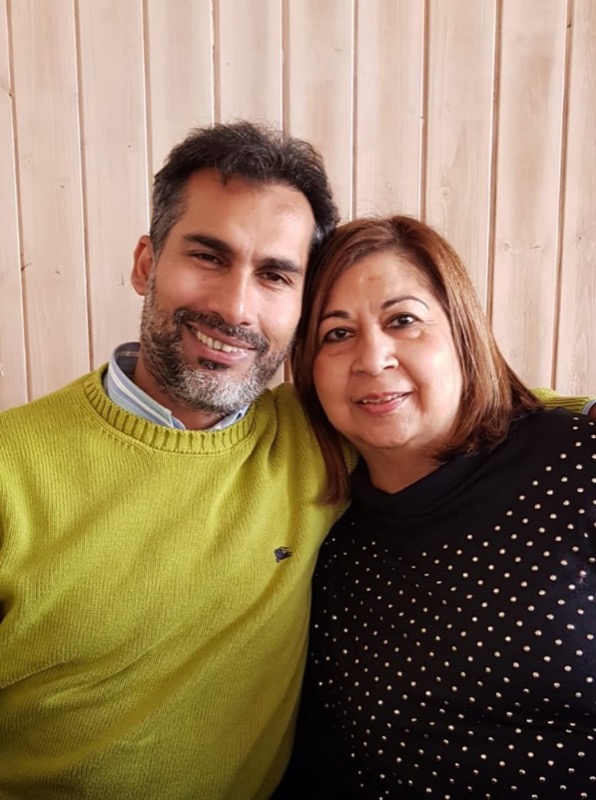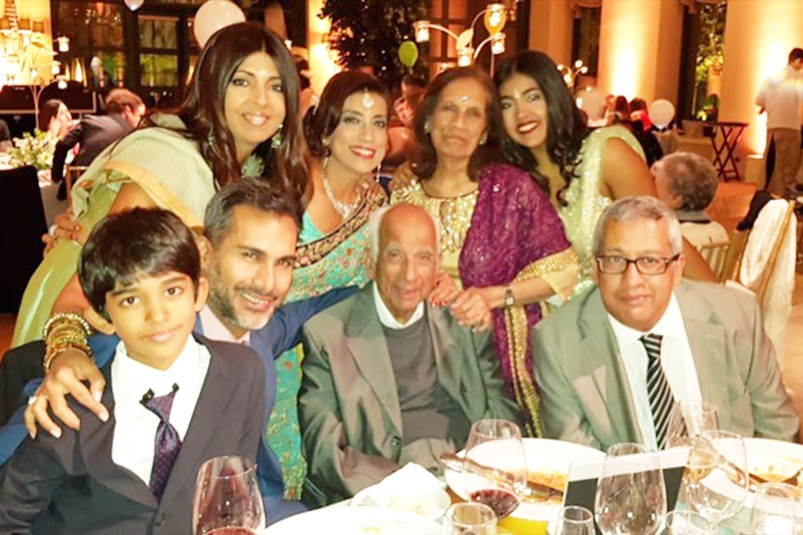On Sunday, June 12, at the age of 50, Raju Shivdasani, a successful teacher and entrepreneur, but above all a good person, passed away suddenly. Among other educational centers he was a professor at CEIP Andrés Manjón and CEPA Edrissis. His colleagues have described him as a close and kind person.
The life of the puróhita (Hindu priest) is a constant vision and practical experience of the dualities of this material world: cold or heat, happiness or sadness. On the 10th he officiated at a wedding (happiness), and almost a week later the funeral (sadness) of his friend Raju. Despite more than 35 years of study and practice of Hindu spirituality, he did not stop being a person with feelings, and the pain increases when the deceased is a friend and leaves us in the full bloom of life. I cannot be oblivious to the pain and sadness of a mother, brothers, a wife and children who have lost their role model. As a priest I always put my knowledge at the service of the family, not only to officiate the rituals but also to bring them a little relief and light from my direct experience and what the sacred scriptures say about the obligatory transit for everyone: death.
Every loss is painful, but even more so when that person is young and dies suddenly, how many words to say and how many things to do?
Each person has different ways of experiencing grief. Some cry a lot and others barely cry. Some people may not need to talk about what they are feeling and others may have the need to express it with the people around them. However, there are also other ways to say goodbye and gradually overcome the loss of a deceased loved one: pray for his soul (vandanam), remember him fondly (smaranam) and through writing (likhita). Without the pressure of meeting a set schedule, without the need to measure my words, writing is my way of paying a small but well-deserved tribute to Raju Shivdasani, may my words be blessed by Sarasvati, goddess of the arts and the knowledge.
My memories
I met Raju in 1984, during a football match organized for the Diwali holiday, I was playing goalkeeper and striker for different teams. I remember it was autumn and the field (old guano factory) was muddy. He was a good player and if my memory of almost 40 years ago does not fail me, he scored a goal and we lost the game. From then on we went out in a group with other friends, some from my country house (1970) and others from theirs (1972).
I remember at a Ceuta Fair in 1987, hugging me and with a few more drinks he told me “Carlos I see the subsoil, I clearly see what is below us” and I did not stop laughing. We remembered that anecdote a few months ago.
Then in 1989 I went to do my military service, and he was very clear that he wanted to be an airplane pilot. In the early 90’s I saw him in Malaga where he lived with another good friend, Shushil. He told me about his practices in small planes and his face lit up, with that smile that showed perfect teeth.
Life put us on different paths, he went to the United States and I spent long periods in India. Then he returned to Ceuta and began to try to revive the family business, he began to study teaching. Everything always in silence, with tenacity, with dedication, I have always admired him because all his successes have not been exempt from difficulties, nobody gave him anything.
Despite the fact that time and circumstances made our friendship fade away, there was always a mutual respect. Raju has perhaps been one of the few Hindus in Ceuta who have recognized my religious and academic work in pursuit of Hinduism in Spain.
How to forget that hot July 2000 when he married Nitu, the love of his life. The wedding lasted several days with many celebrations, I fondly remember seeing him dance and sing (for the first time) a Bollywood song during the Sangit party.
Another unforgettable anecdote was during my Guru’s visit to Ceuta, we met at the Sajnani family’s house. I was holding my son Govinda, and Raju asked me how old is he? I told him right now he’s going to be three years old. And Raju, with a serious face, told me: “you have to send him to school, you have to send him to school”. I replied, “If I already have Raju enrolled in a school, don’t worry.” In his eyes I noticed, on the one hand, a sincere interest that every child receive an education and at the same time I saw compassion in his eyes, that he did not put my personal interests before my son’s education. Friend Raju, my son is going to graduate from ESO in a few days, thanks for your interest in making him a good student.
I could relate more anecdotes, encounters and short but profound conversations. A couple of months ago we met again. I think that was our last long conversation. This time, sailing in a small boat through the bay of Ceuta, during the immersion ceremony for the ashes of his mother-in-law, Nena. She told me that she would like one day for Hindu children to have access to religious education in schools, or at least for a Hindu priest to speak about Hinduism in religious history classes. That he appreciated my work and fights so that Hinduism can obtain well-known roots in Spain. Raju told me: “I remember that while we played soccer, you used to read religious books during breaks, you always had that vocation for spirituality.” He was disenchanted with the mechanical and superstitious religiosity and that he liked my style of being clear and concise when officiating the rituals. Once again, I reiterate my appreciation for his educational work, for being an entrepreneur in the field of education. Days later we coincided again in a ceremony for the soul of his mother-in-law, we never saw each other again and fate wanted me to officiate at his Antyesti kriya (funeral ceremony).
Open letter to Raju

Friend Raju you were not born into a rich family, in your beginnings you had no influence or outlets, but you did have will, self-esteem and the ability to undertake. Perhaps we will never know how many difficulties and obstacles you had to overcome to get your degree, pass the oppositions, found your English academy and many other activities that I do not know.
All of us who knew you, suffer for your death, this day is very sad in our lives, we feel enormous sorrow for your family and loved ones. As best I can, I will offer you my spiritual advice, my affection and my friendship, so stay calm.
All of us who knew you know of your enormous love. Love for your family: your wife Nitu, your daughter Sarika and your son Sunil, who by the way had great integrity and fulfilled his duties as his son throughout your ceremony. The love for your mother, I saw you holding hands walking down the street, the love for your brothers and nephews. Ramesh has always told me about you with pride, you were the son-in-law that every father-in-law would have liked to have: a responsible person with the family, respectful and hard-working.
The love for the co-workers whom you always tried to encourage and help in times of difficulty, so that they felt part of the best team in the school, they all came to give you one last goodbye.
Do not forget to remind us in your new destination, from wherever you are, take special care of your mother, wife, children and all your loved ones, so that they can continue the hard path that life has put before them. Guide us with your example and illusion, so that, even if we do not have your physical presence, we always know how to do the best in this life. No one dies completely as long as they are remembered with love, we, your friends and loved ones, will always remember you and send you light and our best wishes.
You have met what I call the three P’s of Hinduism. You have been Putrah (son), Patí (husband) and Pitá (father) you have fulfilled the main roles of the Hindu tradition.
I can think of nothing else but to remember the song that the group Queen composed after the death of my dear Freddie Mercury: “No one but you (Only the good die young”) (“No one except you (Only the good die young”) Remembering the part of the song that says: And now the party must be over, I guess we’ll never understand. The sense of your leaving, was it the way it was planned? Shakespeare’s language: “And now the party must end, I think we will never understand the meaning of your departure, was this the way it was planned?”
Raju bhaiya, we are both passionate about languages, I told you on occasion, in Sanskrit there is no word “goodbye” Hindus say “Punardarshanaya” which literally means “we will always be seeing each other” or simply said “see you later”. If in this life we will not see each other more physically, surely in some way we will see each other in another life.
I say goodbye to you, with one of my favorite verses from the Bhagavad-gita (capt.2-v.20) and that I recite in the homily for your soul.
na jāyate mriyate vā kadācin
nāyaṁ bhūtvā bhavitā vā na bhūyaḥ
garlic nityaḥ śāśvato ‘yaṁ purāṇo
na hanyate hanyamāne śarīre
The soul is never born and never dies. When it comes into being, it never ceases to exist. It is unborn, eternal, unchanging and ancient. It doesn’t die when the body is killed.
Om Shanti (God bless you)
*He is a Hindu priest, writer and lecturer. He is the current president of the Hindu Federation of Spain and vice-president of the Hindu Forum of Europe.
In memoriam | The man who when he laughed, made the world laugh

